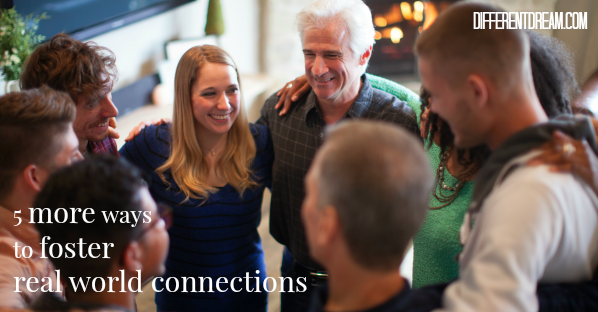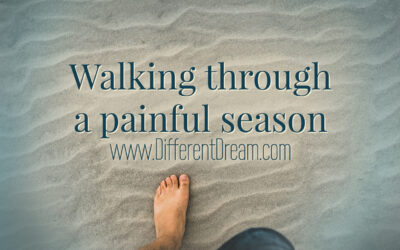5 More Strategies for Staying Connected with the Real World

Staying connected to the real world can be a challenge for caregivers, whether the loved one being cared for is a new baby, a child with special needs, a disabled spouse, or an elderly parent. I’ve been primary caregiver in all those relationships and know the effort required to avoid becoming isolated. Along the way, other caregivers have shared their top strategies for staying connected to the real world. Five of those strategies can be found in a previous post, and I’m passing along the final five below.
Strategy #6: Go to the Park
We moved to a new town a few years ago, and I discovered a good way to meet people is to take my young grandson to the park. It’s easy to strike up a conversation with grandparents or parents while pushing a swing or keeping an eye on kids. Our small central Iowa town has several parks with accessible playground equipment. You can research what’s available in your area by calling the local parks department. If your community lacks accessible parks, your phone call proves the need for them and could be a catalyst for change.
Strategy #7: Partner with Teachers
When I taught school, many of my students had special needs: physical disabilities, illnesses like diabetes, behavioral issues, and learning disabilities. I discovered that by partnering with parents of kids with special needs early in the school year, we could teach typical kids about their classmate’s special needs and how to interact so the child was usually embraced and included at school. If I didn’t do so, the typical kids came up with their own explanations about their classmate, and it usually wasn’t good. Rather than go into detail in this post about how parents and teachers can partner, I promise to do it later.
Strategy #8: Join a Real World Support Group
Online support groups are great, and I belong so several. But connecting with the real world requires real world connections rather than virtual ones. Parents of kids with rare conditions may not find a local group dedicated solely to a specific diagnosis, but they can usually find one for parents of kids with any type of special needs. To find a group, check with a social worker or child life specialist at a children’s hospital in your area. Or call a church in your area with a special needs ministry. Many of them sponsor ecumenical support groups for parents. You might also check with the special education coordinator in your school district. Finally, this blog post explains how the mom of a child with a rare medical condition created her own local support group with help from her son’s doctor.
Strategy #9: Take a Walk
Taking a walk with a child with special needs may have some challenges, but compared to the previous two strategies, it’s fairly easy. Even a short walk, perhaps around the block or down to the corner and back, increases your loved one’s visibility. It creates an opportunity for conversation with others. Bringing your dog on the walk makes it more likely someone will will stop to chat.
Strategy #10: Go to Church
Many churches want to support caregiving families. Not just the families who believe in Jesus, but all families. Some of those churches have formal special needs ministries, while others are more informal. Or they may have a care and compassion ministry. To find welcoming churches, call and ask if they have such ministries, either formal or informal. Ask other parents or your child’s teachers if they know of such churches. If you believe in the power of prayer, ask God to guide you to a welcoming church. A church willing to support you and your family can provide a real world connection like none other.
Do you like what you see at DifferentDream.com? You can receive more great content by subscribing to the quarterly Different Dream newsletter and signing up for the daily RSS feed delivered to your email inbox. You can sign up for the first in the pop up box and the second at the bottom of this page.
By Jolene
Jolene Philo is a published author, speaker, wife, and mother of a son with special needs.
1 Comment
Submit a Comment
Subscribe for Updates from Jolene
Related Posts
Why Did God Make Me this Way?
Guest blogger Steve Siler tells the story of his answer to his son’s question: “Why did God make me this way?”
Can Churches Help Families Raising Children with Disabilities Stay Together?
Can churches help families raising children with disabilities stay together? Guest blogger Mark Arnold explains his opinion.
The Physical Manifestations of Grief in Caregivers
Jolene explains how the heaviness of loss and sorrow can contribute to the physical manifestations of grief in caregivers.






Jolene
The real world support group resonates with me. When our daughter was born, her cardiologist connected us with families with similar diagnosis. The connection was helpful as you found someone you could connect on a level where words were not always needed to fully express concerns. I have met other parents in the same way over the years and we all share information that is priceless.
Lillian